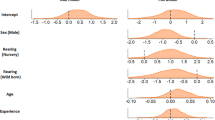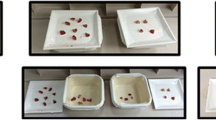Abstract
Seventeen male crab-eating macaques, drawn from two captive troops, were tested on a series of complex problem solving tasks in a Wisconsin General Test Apparatus (wgta). The animals were trained on a series of 6-trial object quality learning set problems followed by a series of 10-trial object quality learning set problems. They were then given problems in which the correct stimulus object was reversed part way through the problem. After the animals reached criterion on this task, the reversal learning set was then extinguished. High ranking animals made more intraproblem errors than low ranking animals on the 6-trial problems, but there was no relationship between social status and the rapidity with which the object quality learning set was established. Animals that received overtraining on the 6-trial problems transferred their learning virtually intact to the 10-trial problems; however, high ranking animals without overtraining made more errors than low ranking animals. On reversal learning and reversal extinction, high ranking animals made more errors on critical trials, indicating that they formed and extinguished the reversal set more slowly than low ranking animals. Object quality sets, as measured by trial-2 performance, were not affected by the reversal conditions.
Similar content being viewed by others
References
Bunnell, B. N., W. T. Gore, &M. N. Perkins, 1980. Performance correlates of social behavior and organization: Social rank and reversal learning in crab-eating macaques (M. fascicularis).Primates, 21: 376–386.
————, 1979. Performance correlates of social behavior and organization: Social rank and omission of reinforcement in rhesus monkeys (M. mulatta).Primates, 20: 77–86.
————, ————, 1979. Performance correlates of social behavior and organization: Effects of group formation on operant performance in rhesus monkeys (M. mulatta).Primates, 20: 197–210.
Meyer, D. R., 1971. The habits and concepts of monkeys. In:Cognitive Processes of Nonhuman Primates,L. E. Jarrard (ed.), Academic Press, New York, pp. 83–102.
Author information
Authors and Affiliations
Additional information
Supported by USAMRDC Contract No. DADA 17-73-C-3007.
About this article
Cite this article
Bunnell, B.N., Perkins, M.N. Performance correlates of social behavior and organization: Social rank and complex problem solving in crab-eating macaques (M. fascicularis). Primates 21, 515–523 (1980). https://doi.org/10.1007/BF02373840
Received:
Accepted:
Issue Date:
DOI: https://doi.org/10.1007/BF02373840




